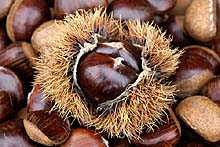Chestnuts Nutrition Facts and
Health Benefits

Chestnuts are believed to be one of the first foods eaten by man, and date back to prehistoric times. In Europe, Asia and Africa, this fragrant and appetizing food source is often used as an everyday potato substitute. Although wonderful straight from the oven, they can be used in many ways, in both sweet and savoury dishes. Chestnuts can be used fresh, pureed, or ground into flour.
Chestnuts contain large amounts of manganese, copper and potassium. Phosphorus, magnesium, iron, zinc and calcium are also present in smaller amounts.
These nuts are a power house of vitamin C. Other nutrients include vitamin B6, folate, thiamin, riboflavin, vitamin K, niacin and pantothenic acid.
The protein in chestnuts is of very high quality, comparable with eggs and is easily assimilated by the human body.
Chestnuts are free of cholesterol and sodium, and unlike other nuts, low in fat. Being low in fat, it is often compared to grains. It also has good amount of dietary fiber. Calorie count of chestnuts is 213.0 per 100 gm.
Interestingly, chestnut trees can live up to five hundred years, but usually do not begin to produce fruit until they are forty years old.
|